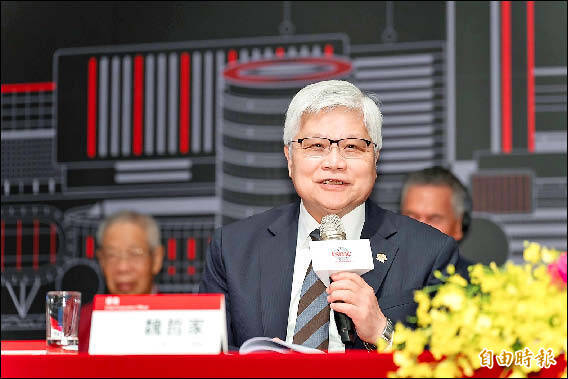《TAIPEI TIMES》 TSMC expects 30% sales growth

Taiwan Semiconductor Manufacturing Co chairman and chief executive officer C.C. Wei speaks at the company’s annual general meeting in Tapiei on June 4. Photo: Grace Hung, Taipei Times
DEMAND FOR AI CHIPS: Net income in the third quarter surged 31.2% quarter-on-quarter to NT$325.26 billion, the strongest quarterly return in the company’s history
By Lisa Wang / Staff reporter
Taiwan Semiconductor Manufacturing Co (TSMC, 台積電), the world’s biggest contract chipmaker, yesterday raised its revenue forecast to annual growth of 30 percent this year, thanks to strong and sustainable demand for artificial intelligence (AI) processors for servers.
It was the second upward adjustment from 25 percent year-on-year growth estimated three months ago, despite recent concerns about whether the AI boom could be another technology bubble.
“The demand is real. It’s real. And I believe it is just the beginning of this demand. Alright, so one of my key customers said the demand right now is ‘insane,’” TSMC chairman and chief executive C.C. Wei (魏哲家) said in response to an investor’s question yesterday, citing Nvidia Corp chief executive Jensen Huang’s (黃仁勳) comments about demand for the company’s newest Blackwell AI chips.
“It’s just the beginning ... and it will continue for many years,” Wei said.
Building on such strong growth momentum, TSMC expects to enjoy healthy growth over the next five years due to AI-related applications, Wei said.
That has reflected robust demand for TSMC’s next-generation technologies.
“We have many, many customers interested in 2-nanometer technology,” Wei said.
“We are, actually, seeing more demand than we have ever dreamed about compared with 3-nanometer. So we have to prepare more capacity for 2-nanometer than 3-nanometer,” he said.
That would be followed by A16 technology, Wei said.
A16 is “very, very attractive for the AI server chips and so, actually, demand is also very high,” he said.
The volume production of 2-nanometer technology is to start next year and production of A16 technology is scheduled for the second half of 2026, according to TSMC’s technology road map.
When asked if TSMC would consider acquiring chip manufacturing facilities from Intel Corp after the US firm spun off its foundry business, Wei said his company was not interested.
The firm is seeing “extremely robust AI-related demand from our customers throughout the second half of 2024,” leading to higher capacity utilization of its 3-nanometer and 5-nanometer process technologies, Wei said.
As a result, revenue contribution from server AI processors is to more than triple this year and account for about 15 percent of TSMC’s revenue, Wei said.
Overall, wafer revenue is to grow about 30 percent year-on-year this year in US dollar terms, he said.
TSMC expects its capital spending to be slightly above US$30 billion this year and spending next year might go up from that record-high level, given the robust demand outlook, the chipmaker said.
Revenue this quarter is expected to be between US$26.1 billion and US$26.9 billion, representing quarterly growth of 13 percent or an annual expansion of 35 percent.
Gross margin is expected to range between 57 percent and 59 percent this quarter, compared with 57.8 percent last quarter and 53 percent in the fourth quarter of last year, the firm said.
TSMC yesterday posted the strongest quarterly net income in the company’s history.
Net income surged 31.2 percent quarter-on-quarter to NT$325.26 billion (US$10.11 billion) from NT$247.85 billion.
That represented annual growth of 54.2 percent from NT$211 billion.
Earnings per share rose to NT$12.54, from NT$9.56 in the second quarter and NT$8.14 in the third quarter last year.
Gross margin surpassed the company’s estimate of 55.5 percent.
Revenue last quarter rose to US$23.5 billion, better than its estimate of US$23.2 billion.
新聞來源:TAIPEI TIMES













